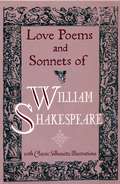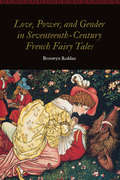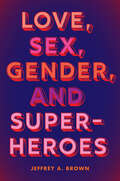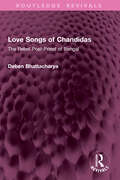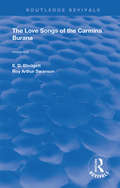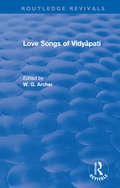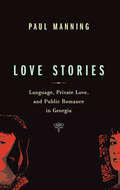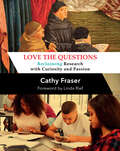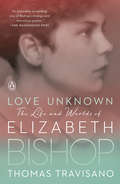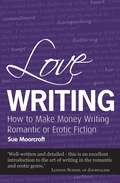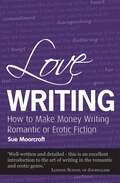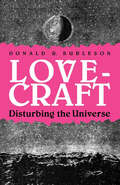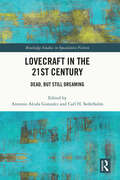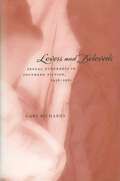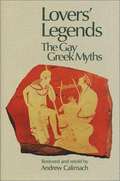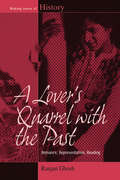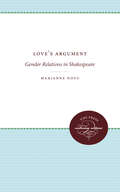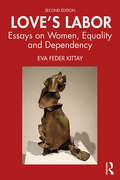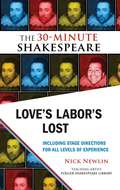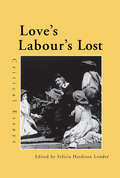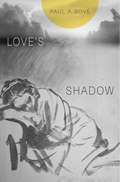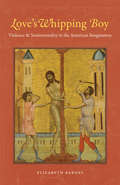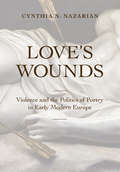- Table View
- List View
Love Poems & Sonnets of William Shakespeare: Super Large Print Edition Of The Classic Love Poems Specially Designed For Low Vision Readers With A Giant Easy To Read Font
by William ShakespeareThe greatest sonnets ever written, by the greatest poet and playwright in the English language--now in a handsome edition featuring exquisite color illustrations.
Love, Power, and Gender in Seventeenth-Century French Fairy Tales (Women and Gender in the Early Modern World)
by Bronwyn ReddanLove is a key ingredient in the stereotypical fairy-tale ending in which everyone lives happily ever after. This romantic formula continues to influence contemporary ideas about love and marriage, but it ignores the history of love as an emotion that shapes and is shaped by hierarchies of power including gender, class, education, and social status. This interdisciplinary study questions the idealization of love as the ultimate happy ending by showing how the conteuses, the women writers who dominated the first French fairy-tale vogue in the 1690s, used the fairy-tale genre to critique the power dynamics of courtship and marriage. Their tales do not sit comfortably in the fairy-tale canon as they explore the good, the bad, and the ugly effects of love and marriage on the lives of their heroines. Bronwyn Reddan argues that the conteuses&’ scripts for love emphasize the importance of gender in determining the &“right&” way to love in seventeenth-century France. Their version of fairy-tale love is historical and contingent rather than universal and timeless. This conversation about love compels revision of the happily-ever-after narrative and offers incisive commentary on the gendered scripts for the performance of love in courtship and marriage in seventeenth-century France.
Love, Sex, Gender, and Superheroes: Photogenic French Literature And The Prehistory Of Cinematic Modernity
by Jeffrey A. BrownImpossibly muscular men and voluptuous women parade around in revealing, skintight outfits, and their romantic and sexual entanglements are a key part of the ongoing drama. Such is the state of superhero comics and movies, a genre that has become one of our leading mythologies, conveying influential messages about gender, sexuality, and relationships. Love, Sex, Gender, and Superheroes examines a full range of superhero media, from comics to films to television to merchandising. With a keen eye for the genre’s complex and internally contradictory mythology, comics scholar Jeffrey A. Brown considers its mixed messages. Superhero comics may reinforce sex roles with their litany of phallic musclemen and slinky femme fatales, but they also blur gender binaries with their emphasis on transformation and body swaps. Similarly, while most heroes have heterosexual love interests, the genre prioritizes homosocial bonding, and it both celebrates and condemns gendered and sexualized violence. With examples spanning from the Golden Ages of DC and Marvel comics up to recent works like the TV series The Boys, this study provides a comprehensive look at how superhero media shapes our perceptions of love, sex, and gender.
Love Songs of Chandidas: The Rebel Poet-Priest of Bengal (Routledge Revivals)
by Deben BhattacharyaFirst published in 1967, Love Songs of Chandidās provides an informative introduction which makes vividly clear the importance of Chandidās to the Indian peasant masses. As the author tells us, the traveller through the Birbhum area of Bengal hears Chandidās everywhere, in the villages, in the fields, on the roads. Night after night, the people gather in the temple courtyards or on the village greens to listen to professional ‘Kirtan’ singers sing his songs of the divine love of Radha and Krishna. The influence of Chandidās on contemporary Bengali literature is equally important, his songs having enriched the work of great poets such as Rabindranath Tagore, Govindadas, and many others. The author also discusses the interesting topic of the Sahaja (‘spontaneity’) movement in Indian faith and literature, as manifested in the songs of Chandidās, and the worship of love-making, divine and human, as an important aspect of this faith. This book will be of interest to students of literature, music, history, cultural studies and South Asian studies.
The Love Songs of the Carmina Burana (Routledge Revivals #No. 49b)
by E. D. Blodgett Roy Arthur SwansonOriginally published in 1987, this book contains the Love Songs of the Carmina Burana, alongisde a select bibliography and textual notes. The collection of poems now known as the Carmina was given its name by Schmeller in 1847, and the Carmina Burana comprises the best and most representative products of goliardism and remains the definitive manifestation of the goliardic movement.
Love Songs of Vidyāpati (Routledge Revivals)
by W. G. ArcherOriginally published in 1963, The Love Songs of Vidyāpati explores one hundred poems by the poet Vidyāpati. The book opens with an extensive introduction providing an overview into the life of Vidyāpati and offering a wealth of information relating to the themes, development, and significance of his poetry. The poems are accompanied by detailed notes and enhanced further by a selection of illustrations. The Love Songs of Vidyāpati will appeal to anyone with an interest in poetry, literary history, and Indian cultural history.
Love Stories: Language, Private Love, And Public Romance In Georgia
by Paul ManningIn the remote highlands of the country of Georgia, a small group of mountaindwellers called the Khevsurs used to express sexuality and romance in ways that appear to be highly paradoxical. On the one hand, their practices were romantic, but could never lead to marriage. On the other hand, they were sexual, but didn't correspond to what North Americans, or most Georgians, would have called sex. These practices were well documented by early ethnographers before they disappeared completely by the midtwentieth century, and have become a Georgian obsession. In this fascinating book, Manning recreates the story of how these private, secretive practices became a matter of national interest, concern, and fantasy. Looking at personal expressions of love and the circulation of these narratives at the broader public level of the modern nation, Love Stories offers an ethnography of language and desire that doubles as an introduction to key linguistic genres and to the interplay of language and culture.
Love the Questions: Reclaiming Research with Curiosity and Passion
by Catherine FraserWith boundless amounts of information available, it is vital that students become skilled at the art of research. In Love the Questions: Reclaiming Research with Curiosity and Passion , author Cathy Fraser outlines ways students can engage with their research projects and truly internalize and transform content.Inside you&’ll learn how to do the following: Honor students&’ passions, interests, and questions by teaching how to embrace inquiry, curiosity, and exploration Teach students how to frame relevant questions throughout the research process and make the information personal Develop authentic projects that include surveys, experiments, and interviews Assess skills, not just memorization by recognizing and legitimizing what students are doing with research on their own Fraser also includes mini lessons, practice activities, graphic organizers, and student examples within the book. Love the Questions recommends teachers and students work with librarians and other school leaders as educational partners, helping students continue to develop their analytical and logical skills.
Love Unknown: The Life and Worlds of Elizabeth Bishop
by Thomas TravisanoAn illuminating new biography of one of the greatest American poets of the twentieth century, Elizabeth Bishop"Love Unknown points movingly to the many relationships that moored Bishop, keeping her together even as life—and her own self-destructive tendencies—threatened to split her apart.&” —The Wall Street Journal Elizabeth Bishop's friend James Merrill once observed that "Elizabeth had more talent for life—and for poetry—than anyone else I've known." This new biography reveals just how she learned to marry her talent for life with her talent for writing in order to create a brilliant array of poems, prose, and letters—a remarkable body of work that would make her one of America's most beloved and celebrated poets. In Love Unknown, Thomas Travisano, founding president of the Elizabeth Bishop Society, tells the story of the famous poet and traveler's life. Bishop moved through extraordinary mid-twentieth century worlds with relationships among an extensive international array of literati, visual artists, musicians, scholars, and politicians—along with a cosmopolitan gay underground that was then nearly invisible to the dominant culture. Drawing on fresh interviews and newly discovered manuscript materials, Travisano illuminates that the "art of losing" that Bishop celebrated with such poignant irony in her poem, "One Art," perhaps her most famous, was linked in equal part to an "art of finding," that Bishop's art and life was devoted to the sort of encounters and epiphanies that so often appear in her work.
Love Writing: How to Make Money Writing Romantic or Erotic Fiction
by Sue MoorcroftLove sells and sex sells and you can earn your living writing about them for novels, novellas and short stories as well as serials for magazines, anthologies and websites. This book holds the secrets of how to achieve success. As well as drawing on her experience as a fiction writer and creative writing tutor, in this 'must-have' book Sue has included questions from aspiring writers - with illuminating responses from published writers and industry experts. Romantic fiction encompasses everything from chart-topping chick lit and romantic comedies, through gritty sagas, sweeping historicals and smouldering erotica to liver-twisting affairs with vampires. Bright, emotional, involving, intelligent storytelling about love and desire is what readers want and will pay for. Do you want to know how to create emotional punch? (Or even what emotional punch is?) How to control dual time lines? Spring your work out of the slush pile? Write a tender love scene that excites passion rather than hilarity? This book reveals all. Sue Moorcroft writes novels, serials and short stories, articles for writing magazines and writing courses. As a creative writing tutor she has taught at the University of Leicester, the London School of Journalism, Adult Learning Services Northants, Writing School Leicester and Writers' News Home Study. A committee member of the Romantic Novelists' Association, she is the editor of their anthology, Loves Me, Loves Me Not. She's a past winner of the Katie Fforde Bursary Award.
Love Writing: How to Make Money Writing Romantic or Erotic Fiction (Secrets To Success - Writing Ser.)
by Sue MoorcroftLove sells and sex sells and you can earn your living writing about them for novels, novellas and short stories as well as serials for magazines, anthologies and websites.This book holds the secrets of how to achieve success.As well as drawing on her experience as a fiction writer and creative writing tutor, in this ‘must-have’ book Sue has included questions from aspiring writers - with illuminating responses from published writers and industry experts.Romantic fiction encompasses everything from chart-topping chick lit and romantic comedies, through gritty sagas, sweeping historicals and smouldering erotica to liver-twisting affairs with vampires. Bright, emotional, involving, intelligent storytelling about love and desire is what readers want and will pay for.Do you want to know how to create emotional punch? (Or even what emotional punch is?) How to control dual time lines? Spring your work out of the slush pile? Write a tender love scene that excites passion rather than hilarity? This book reveals all.Sue Moorcroft writes novels, serials and short stories, articles for writing magazines and writing courses. As a creative writing tutor she has taught at the University of Leicester, the London School of Journalism, Adult Learning Services Northants, Writing School Leicester and Writers’ News Home Study. A committee member of the Romantic Novelists’ Association, she is the editor of their anthology, Loves Me, Loves Me Not. She’s a past winner of the Katie Fforde Bursary Award.
Love Writing: How to Make Money Writing Romantic or Erotic Fiction (Secrets to Success)
by Sue MoorcroftLove sells and sex sells and you can earn your living writing about them for novels, novellas and short stories as well as serials for magazines, anthologies and websites.This book holds the secrets of how to achieve success.As well as drawing on her experience as a fiction writer and creative writing tutor, in this ‘must-have’ book Sue has included questions from aspiring writers - with illuminating responses from published writers and industry experts.Romantic fiction encompasses everything from chart-topping chick lit and romantic comedies, through gritty sagas, sweeping historicals and smouldering erotica to liver-twisting affairs with vampires. Bright, emotional, involving, intelligent storytelling about love and desire is what readers want and will pay for.Do you want to know how to create emotional punch? (Or even what emotional punch is?) How to control dual time lines? Spring your work out of the slush pile? Write a tender love scene that excites passion rather than hilarity? This book reveals all.Sue Moorcroft writes novels, serials and short stories, articles for writing magazines and writing courses. As a creative writing tutor she has taught at the University of Leicester, the London School of Journalism, Adult Learning Services Northants, Writing School Leicester and Writers’ News Home Study. A committee member of the Romantic Novelists’ Association, she is the editor of their anthology, Loves Me, Loves Me Not. She’s a past winner of the Katie Fforde Bursary Award.
Lovecraft: Disturbing the Universe
by Donald R. BurlesonHoward Phillips Lovecraft (1890–1937) has been described variously as the successor to Edgar Allan Poe, a master of the Gothic horror tale, and one of the father of modern supernatural fantasy fiction. Published originally in pulp magazines, his works hav
Lovecraft in the 21st Century: Dead, But Still Dreaming (Routledge Studies in Speculative Fiction)
by Antonio Alcala Gonzalez Carl H. SederholmLovecraft in the 21st Century assembles reflections from a wide range of perspectives on the significance of Lovecraft’s influence in contemporary times. Building on a focus centered on the anthropocene, adaptation, and visual media, the chapters in this collection focus on the following lines: Adaptation of Lovecraft’s legacy in theater, television, film, graphic narratives, and game artwork The connection between the writer’s legacy and his life Considering capitalism, the posthuman, and the Anthropocene when reading Lovecraft How contemporary authors have worked through the implicit racial and sexual politics in Lovecraft’s fiction. Reading Lovecraft’s fiction in light of contemporary approaches to gender and sexuality
Lovers and Beloveds: Sexual Otherness in Southern Fiction, 1936--1961 (Southern Literary Studies)
by Gary RichardsA challenge to traditional criticism, this engaging study demonstrates that issues of sexuality-and same-sex desire in particular-were of central importance in the literary production of the Southern Renaissance. Especially during the end of that period-approximately the 1940s and 1950s-the national literary establishment tacitly designated the South as an allowable setting for fictionalized deviancy, thus permitting southern writers tremendous freedom to explore sexual otherness. In Lovers and Beloveds, Gary Richards draws on contemporary theories of sexuality in reading the fiction of six writers of the era who accepted that potentially pejorative characterization as an opportunity: Truman Capote, William Goyen, Harper Lee, Carson McCullers, Lillian Smith, and Richard Wright. Richards skillfully juxtaposes forgotten texts by those writers with canonical works to identify the complex narratives of same-sex desire. In their novels and stories, the authors consistently reimagine gender roles, centralize homoeroticism, and probe its relationship with class, race, biological sex, and southern identity. This is the first book to assess the significance of same-sex desire in a broad range of southern texts, making a crucial contribution to the study of both literature and sexuality.
Lovers' Legends: The Gay Greek Myths
by Andrew CalimachFirst comprehensive uncensored collection of homosexual Greek myths in years. Lucians Different Loves, an unabashed debate on gay vs. straight love, frames richly illustrated stories of Hercules, Orpheus, Narcissus, others. Presents positive and negative aspects of Greek male love within historical/cultural context. Carefully documented, suitable for classes in gender studies / history / religion. Notes, bibliography, glossary, map. Study guide forthcoming.
A Lover's Quarrel With The Past
by Ranjan GhoshAlthough not a professional historian, the author raises several issues pertinent to the state of history today. Qualifying the 'non-historian' as an 'able' interventionist in historical studies, the author explores the relationship between history and theory within the current epistemological configurations and refigurations. He asks how history transcends the obsessive 'linguistic' turn, which has been hegemonizing literary/discourse analysis, and focuses greater attention on historical experience and where history stands in relation to our understanding of ethics, religion and the current state of global politics that underlines the manipulation and abuse of history.
Love's Argument: Gender Relations in Shakespeare
by Marianne NovyNovy demonstrates how the plays are theatrical transformations of tensions in both ideals and practices in Renaissance society. Analyzing the dramatic images of lover and beloved, of husband and wife, of parent and child, Novy examines the ways in which the conflicts are resolved in the comedies and romances and how they are acted out in the tragedies. Chapters on individual plays provide original interpretations that delineate the tone and texture of gender relations.A UNC Press Enduring Edition -- UNC Press Enduring Editions use the latest in digital technology to make available again books from our distinguished backlist that were previously out of print. These editions are published unaltered from the original, and are presented in affordable paperback formats, bringing readers both historical and cultural value.
Love's Enlightenment: Rethinking Charity in Modernity
by Ryan Patrick HanleyA number of prominent moral philosophers and political theorists have recently called for a recovery of love. But what do we mean when we speak of love today? Love's Enlightenment examines four key conceptions of other-directedness that transformed the meaning of love and helped to shape the way we understand love today: Hume's theory of humanity, Rousseau's theory of pity, Smith's theory of sympathy, and Kant's theory of love. It argues that these four Enlightenment theories are united by a shared effort to develop a moral psychology that can provide both justificatory and motivational grounds for concern for others in the absence of recourse to theological or transcendental categories. In this sense, each theory represents an effort to redefine the love of others that used to be known as caritas or agape - a redefinition that came with benefits and costs that have yet to be fully appreciated.
Love's Labor: Essays on Women, Equality and Dependency
by Eva Feder KittayThis new edition of Eva Feder Kittay’s feminist classic, Love’s Labor, explores how theories of justice and morality must be reconfigured when intersecting with care and dependency, and the failure of policy towards women who engage in care work. The work is hailed as a major contribution to the development of an ethics of care. Where society is viewed as an association of equal and autonomous persons, the work of caring for dependents figures neither in political theory nor in social policy. While some women have made many gains, equality continues to elude many others, as in large measure, social institutions fail to take into account the dependency of childhood, illness, disability and frail old age and fail to adequately support those who care for dependents. Using a narrative of her experiences caring for her disabled daughter, Eva Feder Kittay discusses the relevance of her analysis of dependency to significant cognitive disability. She explores the significance of dependency work by analyzing John Rawls' influential liberal theory and two examples of public policy—welfare reform and family leave—to show how theory and policy fail women when they miss the centrality of dependency to issues of justice. This second edition has updated material on care workers, her adult disabled daughter and key changes in welfare reform. Using a mix of personal reflection and political argument, this new edition of a classic text will continue to be an innovative and influential contribution to the debate on searching for greater equality and justice for women. Love’s Labor has spoken to audiences around the world and has had an impact on readers from many countries and in many disciplines: philosophy, sociology, disability studies, nursing. It has been required and supplementary reading on many undergraduate courses on Ethics, Feminist Ethics, Gender and Religious Ethics, Political Theory, Bioethics and Disability Studies. It has been translated into Italian, Japanese and Korean.
Love's Labor's Lost: The 30-Minute Shakespeare
by Nick NewlinLove's Labor's Lost: The 30-Minute Shakespeare plays three action-packed scenes from this tale of King Navarre and his three lords, who have vowed to retire from women for three years. Naturally, the Princess of France and her three ladies arrive, and comedic courtship ensues.The cutting includes the ridiculous dance of the lords disguised as Russians, the hysterical "Pageant of the Nine Worthies," and a dramatic, bittersweet ending that leaves the King and the three lords laboring for love.The edition includes a preface by Nick Newlin containing helpful advice on how to put on a Shakespeare performance in a high school class with novice actors, as well as an appendix with suggestions for the specific play and recommendations for further resources.
Love's Labour's Lost: Critical Essays (Shakespeare Criticism)
by Felicia Hardison LondreThis anthology examines Love's Labours Lost from a variety of perspectives and through a wide range of materials. Selections discuss the play in terms of historical context, dating, and sources; character analysis; comic elements and verbal conceits; evidence of authorship; performance analysis; and feminist interpretations. Alongside theater reviews, production photographs, and critical commentary, the volume also includes essays written by practicing theater artists who have worked on the play. An index by name, literary work, and concept rounds out this valuable resource.
Love’s Shadow
by Paul A. BovéA case for literary critics and other humanists to stop wallowing in their aestheticized helplessness and instead turn to poetry, comedy, and love.Literary criticism is an agent of despair, and its poster child is Walter Benjamin. Critics have spent decades stewing in his melancholy. What if instead we dared to love poetry? To choose comedy over Hamlet’s tragedy, romance over Benjamin’s suicide on the edge of France, of Europe, of civilization?Paul Bové challenges young lit critters to throw away their shades and let the sun shine in. Love’s Shadow is his three-step manifesto for a new literary criticism that risks sentimentality and melodrama and eschews self-consciousness. The first step is to choose poetry. There has been since the time of Plato a battle between philosophy and poetry. Philosophy has championed misogyny, while poetry has championed women, like Shakespeare’s Rosalind. Philosophy is ever so stringent; try instead the sober cheerfulness of Wallace Stevens. Bové’s second step is to choose the essay. He praises Benjamin’s great friend and sometime antagonist Theodor Adorno, who gloried in the writing of essays, not dissertations and treatises. The third step is to choose love. If you want a Baroque hero, make it Rembrandt, who brought lovers to life in his paintings.Putting aside passivity and cynicism would amount to a revolution in literary studies. Bové seeks nothing less, and he has a program for achieving it.
Love's Whipping Boy: Violence and Sentimentality in the American Imagination
by Elizabeth BarnesWorking to reconcile the Christian dictum to "love one's neighbor as oneself" with evidence of U. S. sociopolitical aggression, including slavery, corporal punishment of children, and Indian removal, Elizabeth Barnes focuses her attention on aggressors--rather than the weak or abused--to suggest ways of understanding paradoxical relationships between empathy, violence, and religion that took hold so strongly in nineteenth-century American culture. Looking at works by Herman Melville, Frederick Douglass, Nathaniel Hawthorne, and Louisa May Alcott, among others, Barnes shows how violence and sensibility work together to produce a more "sensitive" citizenry. Aggression becomes a site of redemptive possibility because salvation is gained when the powerful protagonist identifies with the person he harms. Barnes argues that this identification and emotional transformation come at a high price, however, as the reparative ends are bought with another's blood. Critics of nineteenth-century literature have tended to think about sentimentality and violence as opposing strategies in the work of nation-building and in the formation of U. S. national identity. Yet to understand how violence gets folded into sentimentality's egalitarian goals is to recognize, importantly, the deep entrenchment of aggression in the empathetic structures of liberal, Christian culture in the United States.
Love's Wounds: Violence and the Politics of Poetry in Early Modern Europe
by Cynthia N. NazarianLove's Wounds takes an in-depth look at the widespread language of violence and abjection in early modern European love poetry. Beginning in fourteenth-century Italy, this book shows how Petrarch established a pattern of inequality between suffering poet and exalted Beloved rooted in political parrhēsia. Sixteenth- and early seventeenth-century French and English poets reshaped his model into an idiom of extravagant brutality coded to their own historical circumstances. Cynthia N. Nazarian argues that these poets exaggerated the posture of the downtrodden lover, adapting the rhetoric of powerless desire to forge a new "countersovereignty" from within the heart of vulnerability—a potentially revolutionary position through which to challenge cultural, religious, and political authority. Creating a secular equivalent to the martyr, early modern sonneteers crafted a voice that was both critical and unstoppable because it suffered.Love’s Wounds tracks the development of the countersovereign voice from Francesco Petrarca to Maurice Scève, Joachim du Bellay, Théodore-Agrippa d’Aubigné, Edmund Spenser, and William Shakespeare. Through interdisciplinary and transnational analyses, Nazarian reads early modern sonnets as sites of contestation and collaboration and rewrites the relationship between early modern literary forms.
